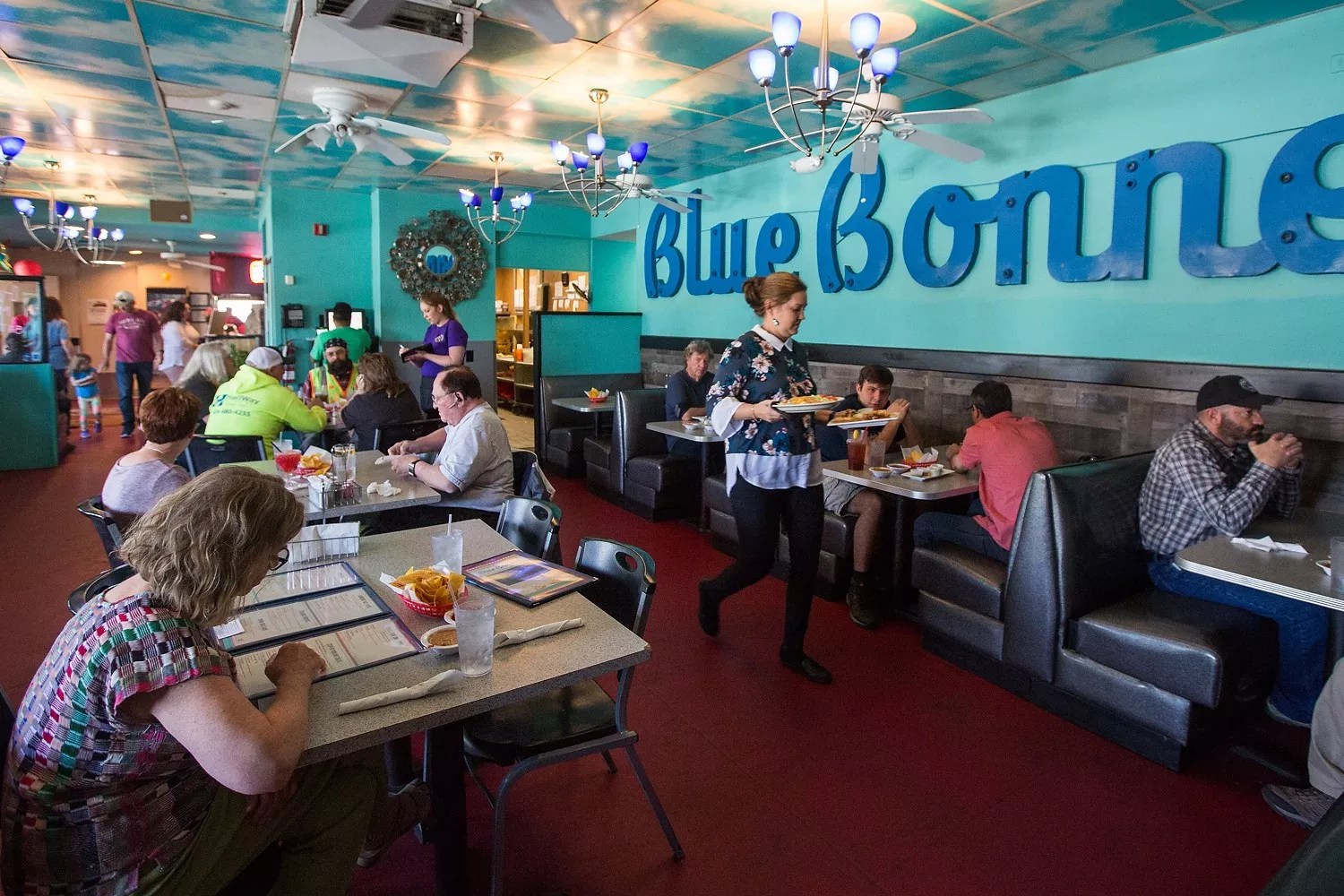
Danielle Lirette

Audio By Carbonatix
The debate rages on. On March 3, the House Committee on Finance heard five hours of testimony regarding HB25-1208: Local Governments Tip Offsets for Tipped Employees. The hearing was tense, emotional and stretched late into the night as both sides laid out deeply-personal stakes in the fight to change regulations around tipped wages in municipalities with a higher minimum wage than the rest of the state, including Denver.
At around 1 a.m., citing the complexity of the issue and the late hour, the committee laid the bill over for further discussion, leaving its fate uncertain.
Representative Alex Valdez kicked off the hearing, framing the bill passage as a requirement to save Denver’s restaurants. “Over 400 restaurants have closed and by our estimation, that means at least 22,000 people in Denver have already lost their jobs,” he said. “ If you look out the window here, you’ll see five shuttered restaurants within one block of here on one side and four shuttered restaurants on the other. Those restaurants were City Grille, Capitol Pizza, Fork & Spoon, Tycoon Ramen.”
HB-1208 Amendments
In response to the bill’s first hearing last week, Valdez had introduced three amendments. Amendments L005 and L008 reaffirmed the requirement that employers supplement pay when tips fall short of the local minimum wage and clarified the definition of “local tipped minimum wage. The meatiest amendment, L007, adjusted the bill to implement a phased approach for reducing tipped minimum wage.
For cities like Boulder, Denver and Edgewater, where local laws have already increased tipped wages above state levels, the amendment would freeze the current tipped minimum wage for 2025. In 2026, it would reduce tipped wage by about $2 with the goal of gradually adjusting down to 65 percent of the local minimum wage by 2028. This would ensure no immediate pay cut for workers (as well as no immediate relief for restaurants). Under the proposal, starting in 2029, any city that sets its own minimum wage must peg its tipped wage between 60 to 70 percent of the full minimum wage.
The starkest, shortest explanation of how each side feels about the bill can be summarized with what they’re calling it. Proponents of the bill refer to it as the “restaurant relief act.” Blue Bonnet Restaurant general manager Chrissy Strowmatt-Becker’s voice cracked as she described how “we had to lay off bussers, hosts, cooks, dishwashers and servers to not be hemorrhaging money over every month. It is the equivalent of 500 hours per month that we have cut since the beginning of this year alone just to survive.”
Opponents call it the “tip theft bill.” In one of the most moving parts of the evening, Denver bartender Savannah Chaput asked lawmakers with a shaking voice, “Have you ever had to simply do your job while a man comments on your body in front of a table full of people? I have. It is the most degrading, demeaning feeling, but we’re conditioned to tolerate it when paid a sub-minimum wage. … Do not put this burden on us as we are all struggling to live. Hear my plea and know I and many others won’t survive if this bill passes. … We gladly serve you. Will you serve and stand for us?”
Here are both sides of the argument on the three most pertinent issues: equity, economics and local power:

Denver’s minimum wage for tipped workers is the focus of House Bill 1208.
Kenzie Bruce
The Equity Argument
Both sides claimed wage equity as a central justification – but with vastly different interpretations.
Proponents framed the bill as a fairness measure for back-of-house staff. “This critical legislation has garnered overwhelming support from our members and back-of-house workers and for good reason. But so many of them are afraid to speak out because of the targeting by the opposition,” explained John Jaramillo, president of the Hispanic Restaurant Association. “Line cooks, dishwashers, prep cooks, kitchen managers who form the backbone of this industry but remain largely invisible to the public eye…these unsung heroes of our restaurants and the backbone of our food service community desperately need relief.”
Opponents rejected this, saying there’s nothing in the bill that guarantees a pay raise for back-of-house workers. “They have a tip pool, split that up between front-of-house and back-of-house, and address that already. They’re weaponizing the term equity here,” said Julian Temianka, economic organizer for the Colorado People’s Alliance, making the point that restaurants already have the power to implement a tip pool (which also requires them to give up the ability to use the tip credit) – but choosing to cut base wages instead is an unfair burden on servers.
Saru Jayaraman, president of One Fair Wage, outlines the issue as equity between the have and have-nots: “Sub-minimum wage for tipped workers is a direct legacy of slavery that has resulted in a workforce that’s overwhelmingly women and people of color struggling with the highest rates of both sexual harassment and economic instability of any industry,” she noted.
Matt Ross, service worker and graduate student, put it more bluntly: “When you want to cut our pay by 25 percent, HB25-1208 is an act of war by the owning class against the working class.”
The Economic Impact Argument
Many exchanges centered on whether HB25-1208 was necessary to save the restaurant industry or if it was a corporate giveaway at workers’ expense.
Supporters warned that without this bill, restaurants would continue closing. “Our labor costs moved from 25 to 35 percent of revenue to 50 to 60 percent…this rate is unsustainable,” said Brad Ritter, owner of Carmine’s Italian restaurants. Owners said if tipped wages weren’t adjusted, even more jobs would be lost, and customers would face higher menu prices.
Opponents pushed back. “The same rising costs that make it harder for restaurants to remain open – higher food prices, rent and other expenses – also make it more difficult for workers to afford housing or for customers to afford dining out,”  said Charles Brennan, director of income and housing policy for the Colorado Center on Law and Policy. “Cutting wages won’t fix that, and could actually make this issue worse by taking more money out of our local economies.”
The Local Control Argument
The power struggle between state and local government was another key factor in the hearing, exposing deep ideological divides between lawmakers who championed local control and those who believed state intervention was necessary to protect businesses.
Opponents argued that HB25-1208 undermined the 2019 law allowing cities to set their own minimum wages. One witness called it “a betrayal,” saying, “We fought for years to give local communities control over their wages. Now you want to rip that away.” Several Denver and Boulder officials submitted letters opposing the bill, calling it “a direct affront to local democracy.”
Proponents insisted that the bill still allows some local flexibility. Representative Valdez pointed to amendments that set a statewide range (60-70 percent of minimum wage) rather than a fixed rate. But critics weren’t convinced. Said one, “This bill bulldozes local control like a reckless toddler with a toy truck…forcing Lakewood and El Paso County under the same wage policy? This is not policymaking. This is clearly a sloppy patch job to save a bad bill struggling to survive under a mountain of bad press and upset workers.”

Tips have create inequality between front- and back-of-house workers at restaurants.
Sam Dan Truong/Unsplash
The Conclusion
As the night stretched on, emotions boiled over. Restaurant owners grew frustrated as they defended their right to stay in business, while tipped workers pleaded for their financial survival. The tension wasn’t confined to the Capitol – several restaurateurs later described the online vitriol they were subjected to after their testimony to the Business Affairs & Labor committee.
After five hours, the committee reached no resolution. “I don’t think anyone’s going to be making great decisions at 1 a.m., so I appreciate all the testimony, everything we’ve heard tonight. It’s certainly a lot to chew on. Good luck discussing amendments. We will take action on this bill at a future meeting,” concluded chair Representative William Lindstedt. With that, the House Finance Committee adjourned.
As witnesses filtered out, some were relieved, some were defiant, and many were simply exhausted. But no one left thinking the fight was over. The battle over HB25-1208 isn’t settled – only postponed. And when it resumes, the stakes will be just as high.